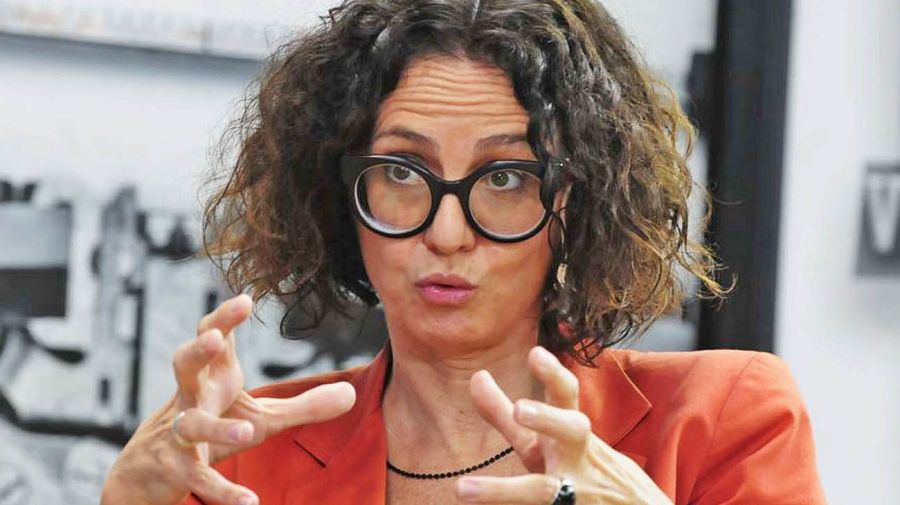A defender of subsidies, import substitution and worker rights, economist and current International Relations Secretary Cecilia Todesca Bocco reflects on the first two years of the Alberto Fernández administration, the impact of the global crisis and the future policies for economic growth in Argentina.
There was a highly resonant comment of yours recently: “They [the opposition] say we have no plan because we have a plan they don’t like.” So my question would be: Is this plan agreed with the International Monetary Fund different from that plan which you said you had and which the opposition did not like?
No, it’s exactly the same. We cannot ask the IMF for a plan for the socio-economic development of Argentina. What the IMF does is to finance balance of payments crises, attaching certain conditions to those loans. When it was created, there were no conditions – that is a subsequent transformation which could be discussed conceptually, questioning why conditions must be attached.
If a country is having balance of payments problems, the IMF lends because no other bank can do so and because precisely what nobody wants is for a problem in one country to infect the rest of the [global] economy, above all speaking in terms of an interrelated world, as is now being seen with this conflict – not only for goods and services but also financially. When an economy enters into a balance of payments crisis, the impact must be reduced in order not infect the rest. So Argentina’s development plan has to be Argentina’s, we cannot transfer this responsibility to the IMF.
Now do those conditions modify that plan which, as you said, “we have, although what happens is that the opposition does not like it”?
No, indeed, now that they are discussing the agreement, they say that there are few conditions or rather that they want more. They have other ideas as to what Argentina’s problems are and how to solve them. I want to be super-respectful with the opposition and their work in Congress because where we’re at, we gain nothing with bombastic statements or running the others down.
Since the IMF was created in the context of the mid-20th century after two world wars with Europe destroyed, they lent money without conditions and now there seem to be less conditions than when you were in the IMF. What year was that?
I was there between 2004 and 2005 [as an IMF senior advisor assigned to the office of the Executive Director].
Let’s compare that pre-subprime IMF of 2004-2005 with today’s and the foundational.
When it was founded, the central countries clearly identified the need for a plan for post-war recovery.
That fund had development as its objective.
Yes, so that conditions were not placed on the table then but afterwards that started to change. What is the difference between the agreement we have now and one beforehand, for example, in 2003? Now in Argentina there is an argument over whether the IMF agreement’s explanations of this country’s problems and its objectives in any way pick up the ideas which we in Frente de Todos have as to what we could do in Argentina. Of course, it’s better than not having an agreement with the IMF, that’s obvious. But within the conditions of what we owe, there are two courses – either we don’t pay or we pay what we owe with the funds which we can generate within the framework of a programme or, as I often say, an aeroplane flies past dropping US$44 billion on us. Some people have the fantasy that there are superpowers who could donate us that money but this would not seem to reflect reality, far less so in this conflictive world we see today. We do not ask from the IMF what the agreement cannot give – what happens to the Argentine economy, how we grow and stabilise. Grow to stabilise, as we put it, not stabilise to grow. Here industrial policy, productive development and job recovery are fundamental.
That would be a neuralgic point for the difference of your vision from the opposition, which says that first you must stabilise to grow while you say that first you must grow to stabilise. Is there a procedural order from which comes first?
There are various differences but it could be summed up that way. We have some explanations which are a bit more complex in terms of inflation and the country’s development. We don’t think that either commercial or financial integration can be done any old way. We don’t think that simply by relaxing all controls on capital markets, you’re going to have the investments pouring in, it’s not like that. We believe that it is explained by demand. You receive investments when the business world supposes that they are going to have to sell more, then they are inclined to invest. We believe that the real economy functions otherwise, supported, of course, by financial instruments and credit.
If you had to explain, appealing to your didactic qualities, what are the central differences between the outlooks of the opposition and the government regarding how to solve Argentina’s economic problems?
That’s a good question and I haven’t thought out how to answer it on the spot.
If, “first things first,” first you grow and then you stabilise, how do you make that compatible with lowering inflation?
Argentina needs to grow and that growth has to be composed of a determined manner of stabilising. We must be helped to go relaxing those external restrictions bit by bit, mobilising and boosting all the resources we have, which are many.
Would it be a growth based on import substitution?
It has to be a growth with import substitution, incorporating science and technology and opening up markets, including sectors of the population lacking access to job markets or to rights and therefore having lower wages without health coverage or pension contributions. It has to be that kind of growth.
It’s not the same thing if employment grows via informal jobs and the self-employed or via registered work in the private and public sectors. We saw that during the pandemic, we had all the private-sector workers registered with a database and that way we could pay them the ATP wage supplements. Nevertheless, we had another mass of people, the famous nine million within the IFE emergency family benefit, which is a considerably more heterogeneous group. Some are workers while others are inactive but there is no way of knowing it. And it was much more difficult assisting that mass of people at that time so it’s not the same thing, as the previous government was saying. It’s all very well to make the entire job market more flexible and in reality it is the same thing between being self-employed and employed – it would be even more flexible to be self-employed because you’d work for whoever you want. But no, because the automatic stabilisers in the economy have their role, i.e. today’s developed economíes developed precisely on the basis of job markets with rights and that had to do with stability. The differences are if you give priority to the world of production and jobs or the financial sphere. That’s a first difference, it may be complemented but the incentives must always be on the side of those who bet on production and jobs. A second question is how you insert yourself in the world. There we also have a difference of vision without that mantra of liberalisation for its own sake. We want to negotiate our way into markets so that our products may enter, not simply signing free trade agreements which in reality are not going to let our products in, basically because they are food and there are health or environmental measures functioning as non-tariff barriers. Always placing ahead the capacities of the Argentine productive sector and the needs of our job market.

To sum up: to generate a growth which has the possibility of stabilising, for which there must be import substitution and job creation.
Yes, and linking up with those regional or global value chains.
The opposition would not disagree with that, save the macroeconomic disarray being the first thing which needs fixing, they’re more monetarist.
But, for example, the volume of money is an influence, of course. And I want to clarify that because they’re not going to tell me that I said you can print any amount of money without any consequences. But the problem of the Argentine economy is not the money printed but the lack of dollars. You can, as happened to the previous government, brusquely shrink the printing of money and still have 50 percent inflation because you had an exchange rate crisis through not closing down the external sector, lowering all the regulations and converting the Argentine Republic into a financial hub. Then you not only have Argentines saving in dollars but you also gave the interest rates in pesos to the foreign bondholders so that they could bring in the dollars, sell them, earn interest rates on the pesos and then exit by buying back the dollars. You thus set a time-bomb ticking. The inflationary level of around 50 percent which we have today is an inheritance of the Macri government. Previously we were not in such circumstances. The brutal devaluation of 2018-2019 left us with that momentum. The simplification of the inflationary phenomenon is one of the differences we have. I insist, labour rights do not explain Argentina’s macroeconomic problems or the lack of business starts.
Concretely, you are referring to labour reform.
Of course. In the world, when you go over the labour reforms, it is not true that you create jobs by carrying out the pro-market reforms which they seek. There is not a single case of that. The only thing created is workers with less rights. And when things happen to us as they happened in the last two years, those workers are less protected because nobody cares about people. Governments should care but that also has a macroeconomic impact. If people are left without income, this afterwards explains the [low] demand. So if you don’t do it for ethical reasons, you have to anyway because if you don’t, the economy retracts.
You mentioned the lack of dollars and the inflationary effect that has. The announcement of an agreement with the IMF produced a stabilisation of the dollar fluctuations. Do you think this will be maintained because one of the positive elements of this IMF agreement is calming the exchange markets?
If in reality what we were having was the contrary, to the degree in which the negotiations were stretching out in time, you have the expectation of devaluation, today, here and now. Somehow you are placed in the worst of all worlds, which is negotiating with the IMF, because you have already renounced not paying, negotiating instead, but you never finish negotiating so everybody is expecting an exchange rate lurch, which generates price increases with exports and investments being held back. Because if I have the money to invest and have no clarity as to what is going to happen in the next two or three months, then I wait. We have to get out of that situation. It is to be hoped that at least these expectations of devaluation calm down and that should calm the exchange markets.
You are reaching agreement after over two years in government. Wouldn’t it have been better to reach it faster? Has the pandemic ended up being negative by stretching out the periods or did the pandemic make the IMF more sensitive, permitting more benign or less demanding conditions?
The plan outlined by the Economy Ministry aimed first at the recovery of the peso market because it was closed after the famous reprofiling. Afterwards came the discussion with the bondholders and, in third place, the IMF.
In the midst of that appeared the pandemic.
The pandemic appeared 99 days into our administration and was much longer than any of us would have expected with medium-term and long-range effects which we are still feeling today. Once we had finished the negotiations with the bondholders, we started negotiating with the IMF. Perhaps it could have been done faster otherwise. There is never only one single exit route – that does not exist by definition. This is what we found in a negotiation which has been difficult. We believe it to be a good result. I insist, we do not believe that the IMF agreement will solve the structural problems of the Argentine economy because we do not believe this to be the role of the IMF. We do believe that many things which might seem like an IMF imposition in reality constitute an agenda which Argentina should be adopting anyway. I’ll give you an example: the objectives of the fiscal deficit. Just as it was absolutely necessary to throw in everything we had at the time of the pandemic to assist businesses and workers, at a time when you are growing, you have to reduce the deficit. Above all, if we have a diagnosis shared by everybody that this is an economy excessively in debt, above all in foreign currency. So if that’s the diagnosis, that means that when you start to move on the right track, you have to go reducing the deficit simply in order not to keep on falling further into debt. The agenda which we have ahead of us continues to be moving forward bit by bit, as [Economy Minister Martín] Guzmán has said, calming the economy and coming out of this double crisis, which is really a very disagreeable combo. A balance of payments crisis plus pandemic. Two years plus two years.
How do you imagine the quarterly reviews? Will they go creating tension every three months as to whether targets are being met or not?
There will be a number of projections which we hope will comply with the forecasts. There will be a lot of noise and uncertainty. The technical teams will be going into training camp, so to speak. I believe and hope that we’ll be having a good level of dialogue, as we have had until now with the IMF staff, to try and understand why we are meeting or not meeting the targets. And, I repeat, always trying to focus on our substantive agenda, which is what should be developed.
What are your projections as to growth and inflation? In what shape do you think the economy will be, come the elections?
The momentum from last year points to between three and four percent for this year. But, of course, that is only if nothing changes and even before the war in Ukraine we had the effects of the drought with its impact on exports – on the one hand, less production due to the drought but higher prices. So making those projections is not so easy. But whatever, this year the economy is going to grow, short of an international debacle which today is not on the cards since I have not read any article pointing that way. So the Argentine economy is going to grow. Growing two years running is something which has not happened for years in Argentina, that would be very good. If that were so and the content of that growth is the same we saw last year, related to the industrial policy which we have been deploying, we will grow next year too and that would be much more atypical yet. Three continuous years of growth.
Are you less optimistic than you were three years ago when it was presumed that you could grow by five percent?
It remains to be seen how permanent are the effects of the increases of energy prices on the one hand and commodity prices on the other. The end of the pandemic plus the conflict in Ukraine are pulling back the growth rates in other countries as well. It needs to be seen how much this oil slick expands.
Before Ukraine the target was to reduce Inflation from 50 to 40 percent but today it threatens to rise from 50 to 70 percent. Are you also more pessimistic regarding inflation?
Yes, the increases in energy and food prices now being seen are a challenge for Argentina in the circumstances we are now in and the government is going to have to deploy a pretty full tool kit to counter this. This is a global phenomenon and an external shock so there’s not much we can do about it.
Let me now enter into such personal topics as your exile, your double-barrelled surname, your foster father, from whom you seem to have inherited your passion for economícs, and your biological father, from whom you inherited your Peronist militancy, using both surnames. How was that process?
When I changed my surname, I was in university. It was a simple adoption although I always joke: there was nothing simple about it. Basically what it means is that you do not lose your links with your biological family. What it does do is to invert the surnames with the surname of your foster parents coming first and the surname of your original family second. Thus I was called Cecilia Bocco and am now called Cecilia Todesca Bocco. It was the culmination of a process which began very many years ago. After the death of my father, my mother found a new partner, fell in love and formed a family. For many years I continued to be called Cecilia Bocco and it was many years later that this adoption was decided so that the man who had been a father to us for so many years was also reflected in our identity and our identification papers.
What was your exile in Mexico like and your studies there after returning here?
In very adverse conditions, my parents did a great job as parents. Firstly, my mother and father put our lives back together between them. My mother was the first to find work in Mexico, with two families living off her salary. And despite all the difficulties, I was raised in a house where there was always room for reading, time in common and political discussion. They were good parents in pretty adverse circumstances.
Your foster father, Jorge Todesca, was an official in Mauricio Macri’s government. Did that create the possibility of a different kind of understanding with the opposition, being able to understand each other and escape the grieta chasm? What conversations did you have with him at that time?
Yes, we experienced the grieta within the family and we also had something of an antídote against it, which is a question of being able to respect others and identify the differences but without attacking, trying to understand what the other has been saying. My father was a very intelligent and exceptionally hard-working person with a great love for the people, the public sector and government policy. So I was always totally certain that wherever he went, he was going to do a very good job and so it was. I’m very happy for everybody and for him in particular that he put everything into his last job because he had a very long track record.


























Comments